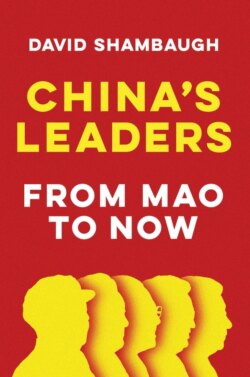Читать книгу China's Leaders - David Shambaugh - Страница 15
The Influences of Chinese Political Culture
ОглавлениеCCP leaders are, of course, communist (Marxist-Leninist) in their orientation. In the next section we examine the unique aspects of communist party systems and how that institutionally and normatively shapes the environment in which the CCP leaders examined in this book must operate. They are also Chinese leaders and are thus deeply shaped by historical and cultural traditions of politics and rule. As far back as Plato’s Republic it has been recognized that the cultural socialization of politicians is determinative of their orientation and behavior. There are limits to the political culture approach, of course, as criticisms tend to take aim at the level of (over)generalization of alleged influences, but I nonetheless am one political scientist who finds this analytical approach extremely insightful and valuable. Below I list a number of the most salient residual elements and built-in assumptions from Chinese historical political culture that have continued to influence post-1949 CCP leaders:
Leaders should inherently be benevolent (王道) and look out for the best interests of the people. Rulers should set a moral example (道德) through their behavior. Legitimacy is based on benevolent and benign morality.
While benevolence is preferred, coercion against usurpers is justified to maintain stability and the sanctity of the regime; excessive coercion, however, is considered hegemonic (霸道) and thus illegitimate.
The physical core (内心) of China is ethnically Han; other ethnic groups on the periphery, as well as further away, are “outsiders” (外人) or “barbarians” (夷人).
Other powers are predatory, foreigners have ulterior motives to take advantage of China, and thus are not to be trusted.
China is a global great power with over 3,000 years of history and a highly accomplished civilization and is deserving of respect from all others on this basis. Restoring China to global status as a respected great power is the primary mission of all Chinese leaders.
China is the leading power in Asia and should be treated deferentially by all neighbors (the “tribute system”).
Beginning in the late eighteenth century until 1949 China experienced external aggression and plundering by foreign (mainly European) powers—leading to the “century of shame and humiliation” (百年国耻). China must never again be subjected to such physical dismemberment, social exploitation, and psychological trauma.
Japan’s aggression during the Sino-Japanese War (1894–1895) and atrocities in China (1937–1945) are unforgivable.
A strong national identity and patriotic nationalism must be inculcated in all Chinese.
To the greatest extent possible, China must remain as autonomous and self-reliant (自力更生) as possible vis-à-vis other nations; (inter)dependency is a recipe for manipulation.
Avoid open confrontation with others, but use deception and a variety of Sun Zi-like tactics to neutralize and overcome adversaries.
A strong state is the best defense against both internal and external threats.
Disorder (乱) is an ever-present possibility, but to be avoided at all costs. Consequently, a premium is placed on maintaining “stability” (稳定) and order (秩序).
Regional and local centrifugal forces are always strong and pull against the centripetal power of the Center. As a result, there is a tendency for the periphery to feign compliance with the Center (a phenomenon known as “the sky is high and the emperor is far away”: 天高皇帝远).
Elite politics can be a zero-sum game of “tigers eating tigers.” Never trust others, as they likely are seeking to subvert your power and position.
Maintenance of “face” (面子) and avoiding embarrassment is essential not only in Chinese society, but also in dealings with foreigners. Elaborate lengths are gone to in order to avoid public embarrassment and maintain appearances of confidence and grandeur.
The people of China are a “loose sheet of sand” who need to be led through the tutelage of enlightened elites.
Maintain flexibility and avoid dependence in foreign relations.
Play the long game and keep a clear eye on end goals. Time is always an asset. Do not be impatient. Maneuver is a constant tactical feature, as all relationships are eternally fluid.
Vigilantly safeguard China’s territories and claimed sovereignty.
These are many of the operative assumptions I believe China’s leaders are inculcated with. They are subliminal assumptions, which individual Chinese may not even be conscious of, but these assumptions all are inherited from the past and have real impact on people’s behavior. Additionally, China’s leaders have in common with leaders of other developing countries their nation’s historical encounters with Western imperialism and colonialism, the strong mission to gain independence and autonomy, and thus the imperative to undertake modernization and nation-building.19
